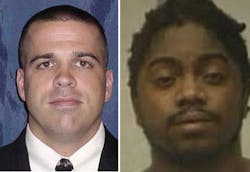Cop-Killer's Fate Shapes N.H. Death Penalty Debate
CONCORD -- New Hampshire needs to repeal the death penalty, judges, police, religious leaders and victims' family members told the Senate Judiciary Committee Thursday.
About 200 people filled Representatives Hall for a public hearing on House Bill 1170, which would end the death penalty for capital murder and replace it with life without parole.
A large majority of those testifying supported repeal. But several police officers and representatives said the death penalty helps keep the public safe because it acts as a deterrent.
And they said if the death penalty is repealed, the state's sole death row inmate, Michael Addison, is apt to have his sentence commuted by a federal court -- and that, they contended, should not happen.
Addison was convicted and sentenced to death for the 2006 shooting death of Manchester police officer Michael Briggs.
Under the bill, Addison's death sentence does not change, although committee Chairman Sen. Sharon Carson, R-Londonderry, contends the bill repeals sections of law that deal with the capital murder procedure and the execution, which would make a death sentence impossible. Others disagreed.
Repeal proponents are buoyed by Gov. Maggie Hassan's support and the 225-104 House vote to repeal.
The bill is expected to face a more difficult battle in the Senate, where the vote is likely to be decided by one or two senators.
During Thursday's hearing, former Supreme Court Chief Justice John Broderick said he has been a reluctant supporter of the death penalty in the past, but has changed his mind. He said the United States is the only industrialized country in the world that continues to put its citizens to death.
"I hope New Hampshire does not miss this opportunity to stand up and stand out in the 21st century to say 'That's enough,'" Broderick said. "This is an opportunity to not let the wave of history pass us by. To say 'Not in our state.' We're smarter than that, we're better than that."
New Hampshire does not want to join North Korea, Saudi Arabia and Iraq as the leading government executioners, Broderick noted.
Kensington Police Chief Mike Sielicki defended the death penalty, saying it is a tool that helps keep the public safe.
If the repeal passes, "some federal judge sitting up there will commute Michael Addison's sentence, and we cannot have that," Sielicki said. "We cannot get to the point where Michael Addison spends the rest of his life in jail."
"How quickly we forget the Mont Vernon murder," said Rep. Jeannie Notter, R-Merrimack, who said she visited the Cates home where Kim Cates was killed and her daughter maimed in 2009. "I know a lifetime in jail is not justice for a crime like this."
Inspired by the Cates case, the last change to the state's capital murder law was to expand it to include murder committed during home invasions.
Lawmakers passed a repeal in 2000, only to have then-Gov. Jeanne Shaheen's veto sustained.
House Bill 1170's prime sponsor, Rep. Robert Cushing, D-Hampton, is a longtime advocate for repealing the law. Cushing, whose father was shot and killed by an off-duty Hampton police office in 1988, co-founded the Murder Victims' Families for Human Rights in 2004.
"If we let people who kill turn us into killers, then evil triumphs," Cushing said. "The death penalty doesn't do the one thing we all want: to bring that person back."
Religious issue
Religious leaders said execution leaves no room for personal redemption.
"We look for human beings to make a radical turnaround," said Bishop Peter Libasci of the Roman Catholic Diocese of Manchester, "when they realize 'The bad has to stop, the evil has to stop, and it has to stop with me.'"
Debating repeal of the death penalty during Lent is fitting, said A. Robert Hirschfeld, Episcopal bishop of New Hampshire.
"Lent is a time of contrition, of changing minds and hearts toward a more civil and just realm," Hirschfeld told the committee.
He added: "My hope and prayer is that you may be led to vote for repeal so that our communities will uphold and restore the dignity of our citizens that the death penalty callously diminishes."
Changing opinions
Former attorney general Philip McLaughlin supported the death penalty and considered seeking it by bringing capital murder charges in several well-known cases during his tenure -- the murders of Epsom police officer Jeremy Charron and 6-year-old Elizabeth Knapp of Hopkinton.
But a 2001 murder case made him reassess his position.
McLaughlin told the committee he was moved by the daughter of slain Dartmouth College professors Half and Susanne Zantop. McLaughlin said she "was the measure of dignity" and showed how people could rise above feelings of anger.
Walter Murphy, retired chief justice of the Superior Court system, said there is not a whisper of evidence the death penalty deters someone from committing murder. If that were true, he said, Louisiana and Texas would be the safest states in the country instead of having the highest murder rates.
New Hampshire has not executed anyone since 1939.
The committee will decide at a later date what recommendation to make on the bill.
Copyright 2014 - The New Hampshire Union Leader, Manchester
McClatchy-Tribune News Service
